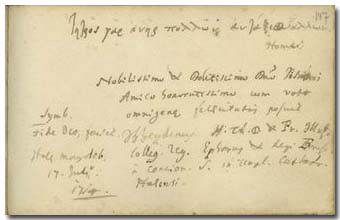
 * *
Homer[us]
Nobilissimo & Politissimo D[omi]no Possessori Amico honoratissimo,
cum voto omnigenae felicitatis posuit
J. H. Heydenus SS: Th[eologiae] D[octor] & Pr[ofessor], Illus[tris] Colleg[ii] Reg[ii] Ephorus & Regi
Boruss[iae] à concior. S. in templ. Cathedr. Halensi.
Symb. Fide Deo, faciet. *
Hale Magdeb[urgicae] 17. Julij 1714
|
* Homer, Ilias 11.514. *
This motto is probably an abbreviation of Psalm 37:5: “Commit
thy way unto the Lord; trust also in him; and he shall bring
it to pass.” In the Vulgate: “Revela Domino
viam tuam et spera in eum et ipse faciet.” Johann Georg
Gullmann quotes it in a more complete form on
p. 455.
|
|
|
For the healing men is worth of many others. (Homer) *
I wrote this to the very noble and erudite
owner [of this album], to my honoured friend, wishing him all kind
of happiness.
J. H. Heydenus, doctor and professor of
theology, supervisor of the noble royal college, preacher of the
King of Prussia and of the cathedral of Halle
Motto: Trust in God, he will act. *
In Halle of Magdeburg, on July 17, 1714.
|
p.
147. Halle, July 17, 1714
Heyden, Johann Huldreich
(1662-1727), German Reformed
theologian
Johann Huldreich Heyden
(Heyd) was born on September 2, 1662. in the village of Benken
near to Basel. His father, Jakob Heyden was the teacher of the
local school. The young Johann learned in Basel, and while he made
remarkable advances in theology and philosophy, nevertheless he
accepted a teacher's position in a low-level (trivial) school in
Basel from 1682 to 1691. At the end he was however discharged,
because he took part in local riots. He became army chaplain at
the Swiss, and in 1694 at the Dutch army. He studied in Heidelberg
and in Dutch academies. From 1696 he was pastor and school rector
in the town of Meisenheim (today in Bad Kreuznach,
Rheinland-Pfalz). He was a pastor also in Zweibrücken. He
graduated in 1710 in Heidelberg, and became preacher of the
cathedral of Halle, professor of theology, supervisor of the royal
college, and member of the church council. In all these offices he
won great acknowledgements. He was a member of the English Mission
Society. He died on August 27, 1727. Some of his works: Fröliche Traurigkeit, das ist,
Schrifft- und vernunfft-mässige Anweisung wie ein glaubiger Christ
unter der Creutzlast sein Haupt frölich empor heben möge.
[Sine loco], 1692. – Der durch die Sünde verscherzte Wohlstand
und verlohrne Kron, Zweibrücken, 1697. – Oratio funebris in
… Caroli XI Suecorum, Gothorum & Vandalorum regis … obitum
… dicta d. XI. Septembris styl. v. MDCXCVII. Zweibrücken, 1697.
– Disputatio theologica inauguralis de religione.
Heidelberg, 1710. – Disp. de divinitate Scr. S., Halle,
1710. – Oratio inauguralis de conscientia. Halle, 1710.
– Our Library keeps a dissertation of
Halle from 1716 defended by David Naudaeus under his
chairmanship.
•
DBA I 533: 14-19 • DBI • Dunkel I/1, I/2, II/1, II/4 •
Jöcher-Adelung II 1985 |

